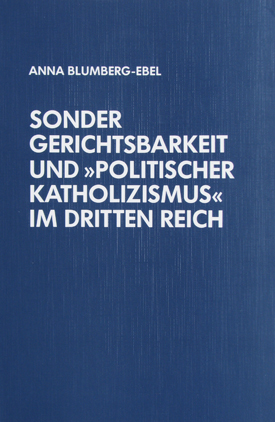Blumberg-Ebel, Anna: Sondergerichtsbarkeit und »politischer Katholizismus« im Dritten Reich, Mainz 1990

The author investigates the Third Reich’s special courts as important institutions of the Nazi judicial system and analyzes their decisions against so-called »agitators against the people« and those deemed »impediments to the construction of the National Socialist state.« The legal precedent for the special courts’ judgments was the Heimtückegesetz (treason law) introduced in 1934, which served to »muzzle« opponents and underscore Nazi claims to totalitarian control over state and society.
Following the National Socialist alignment of political parties, unions, civic organizations, and much of the press, Catholic clergy and laypeople who resisted the Gleichschaltung of conscience, as well as efforts to push Catholicism from the center to the fringes of societal life and »confine it to the sacristy,« emerged as the most important ideological opponents remaining in the country. They became the targets of special jurisdiction, amplified by Göring’s 1935 circular »On Combatting Political Catholicism.« These cases represent onyl a portion of the special courts’ decisions but they enable readers to trace, within certain thematic limits, the development of these institutions from 1933 until the war years. The treason cases against Catholic clergy and laypeople examined in this context offer direct insight into the everyday life of Catholic communities in the Nazi period and illustrate the conflicts between regime and Church on a local level.
To order our publications, please, contact your local bookshop or the publishing house Schöningh in Paderborn.
